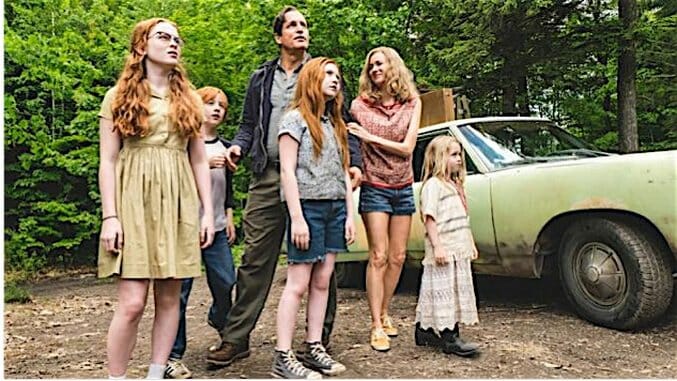The Glass Castle

1. The Glass Castle is a two-hour fight between a messy, sad, angry real-life family story and a Hollywood movie that keeps trying to soften all the edges and turn the tale into something “inspirational.” It begins to feel like a heavyweight brawl, with one side landing haymakers before withstanding shots of its own that send it reeling into the ropes. In many ways, the movie is at that war with itself, the darkness and chaos and, yes, love of a dysfunctional, broken-but-still-bonded family structure trying to escape the clutches of convention and pablum that threaten to pull it underwater at every opportunity. There are portions of The Glass Castle that will move you to tears. There are also portions that will make you want to throw your popcorn across the theater. Your ability to make it through the dreck to what The Glass Castle really has to offer may vary. You’ll be yanked back and forth yourself.
2. Based on Jeannette Walls’ best-selling 2005 memoir, The Glass Castle tells two intertwining stories. The first concerns the Walls family in the late ’60s and early ’70s, a transient bunch led by eccentric, tortured alcoholic genius Rex (Woody Harrelson) and his enabling, also troubled wife (Naomi Watts) who spend nearly a decade roaming from city to city, avoiding police and pulling various scams as Rex keeps claiming he’s about to come up with an invention that will make them all rich. The second focus on a grownup Walls (Brie Larson), now working as a gossip columnist for New York magazine, attempting to keep her life together in the big city as her parents, now older and homeless, squat in a building on the Lower East Side and scourge through dumpsters for food. We learn about Rex’s violent outbursts, his undeniable love for his children, his crippling alcoholism and his monstrous mother whose sickness might have been the source of everything wrong in his life (and his kids’ lives) in the first place. We learn quite a bit about Rex.
3. One of the major issues of this adaptation of Wells’ book is that, well, we really don’t learn a lot about Wells. The movie keeps telling us that she is “strong” like her father, but Larsen, a wonderful, instinctive actress, doesn’t have much to do other than alternate between looking appalled and vaguely worried. She ends up being lost in her own memoir, a bit of a cipher we find ourselves straining to get a grip on. Part of this is the contrast with Harrelson, who plays Rex in such a big way—part beat poet, part devoted father, part total stain on the lives of everyone he loves—that he has a tendency to elbow out everybody else in the frame. It’s an inspired performance, bringing out the best of Harrelson (slight derangement dotted with bemusement at the world, and at himself) and muting what can be self-indulgence in the wrong hands. He’s magnetic, and you can see why, for a brief while, you’d follow him anywhere. But it’s so showy and larger-than-life that the rest of the movie, like his wife (a role that gives the brilliant Watts even less to do than Larsen), tends to just be quiet and step out of his way every time he’s on screen.
-

-

-

-

-

-

-

-

-

-

-

-

-

-

-

-

-

-

-

-

-

-

-

-

-

-

-

-

-

-

-

-

-

-

-

-

-

-

-

-








































